大学英语三级考试语法复习要点总结
大学英语3考试知识点总结

大学英语3考试知识点总结大学英语3是大学英语课程的一部分,是一门重要的课程。
在大学英语3考试中,通常包括听力、阅读、写作和口语等方面的考核。
要在考试中取得好成绩,就需要对大学英语3的相关知识点进行系统地总结和复习。
下面将对大学英语3的各个知识点进行详细总结:听力部分在大学英语3的听力考试中,通常考查考生的听力理解能力。
考生需要听懂各种口音和语速的英语,理解并抓住主要信息和细节信息。
因此,考生需要掌握一定的听力技巧,如预测题目内容、注意关键词、利用上下文推测意思等。
在进行听力复习时,考生可以选择一些与大学英语3听力内容相近的英语电影、英语新闻等进行听力练习,提升自己的听力水平。
在练习时,务必注意听力材料的多样性,包括不同口音、语速、语调、背景噪音等,以帮助自己适应多样化的听力考试内容。
阅读部分在大学英语3的阅读考试中,考生需要阅读一些英语文章或故事,理解并回答相关问题。
阅读题目可能包括多项选择、配对、填空等形式。
因此,考生需要培养自己的阅读理解能力。
在进行阅读复习时,考生可以选择一些英语原版书籍、报纸、杂志等进行阅读练习。
同时,要注重积累一些英语词汇和表达方式,以提高自己的阅读速度和理解能力。
还可以通过做一些阅读模拟题,提升自己的应试能力。
写作部分在大学英语3的写作考试中,考生需要根据所给的题目,写一篇短文或文章。
写作内容通常涉及日常生活、社会热点、文化交流等方面。
因此,考生需要具备一定的语言表达能力和逻辑思维能力。
在进行写作复习时,考生可以选择一些与写作题目相关的话题进行练习,培养自己的写作习惯和创作能力。
同时,要注重积累一些常用的句型、短语和表达方式,以提高自己的语言表达能力。
还可以通过做一些写作练习题,提升自己的写作水平。
口语部分在大学英语3的口语考试中,考生需要进行口头表达,回答问题、描述图片或文章等。
口语考试通常要求考生具备一定的口语表达能力和语音语调准确。
因此,考生需要进行口语练习,提升自己的口语表达能力。
英语三级必背知识点

英语三级必背知识点1. 时态和语态:- 当前时态:一般现在时(Simple Present)、现在进行时(Present Continuous)- 过去时态:一般过去时(Simple Past)、过去进行时(Past Continuous)、过去完成时(Past Perfect)- 将来时态:一般将来时(Simple Future)、将来进行时(Future Continuous)、将来完成时(Future Perfect)- 语态:被动语态(Passive Voice)2. 名词:- 可数名词和不可数名词- 单数和复数形式的变化- 特殊名词的变化,如不规则复数- 可数名词的限定词(定冠词、不定冠词、数词、形容词性物主代词等)3. 代词:- 主格代词和宾格代词- 物主代词和反身代词的变化- 指示代词、疑问代词和不定代词的用法、变化和区别4. 形容词和副词:- 形容词的基本用法和比较级、最高级的变化及用法- 副词的作用、位置和用法5. 动词及动词短语:- 动词的时态、语态和形式变化- 动词短语的构成和用法,如动词+副词、动词+介词短语等6. 介词:- 常用介词的基本用法、位置和搭配- 表示时间、地点、方式、原因等不同含义的介词7. 连词:- 并列连词、从属连词和关联连词的用法及区别- 连词短语和从句的构成和用法8. 冠词:- 定冠词和不定冠词的基本用法和区别- 冠词的特殊用法,如序数词、最高级前的用法等9. 数词:- 基数词和序数词的用法和变化- 分数、小数、百分数的表达10. 句子结构:- 主谓结构、主谓宾结构、主谓表结构等基本句型- 特殊句型,如祈使句、感叹句、倒装句等11. 陈述句、疑问句、否定句、祈使句的构成和用法12. 定语从句和状语从句的基本用法和连接词的选择13. 直接引语和间接引语的变化和转换14. 复合句的标点符号和连接词的运用15. 重要的语法规则和常见的错误用法,如动词时态和语态的混淆、形容词和副词的混淆、代词和名词的混淆等。
最新大学英语三级语法知识总结汇总
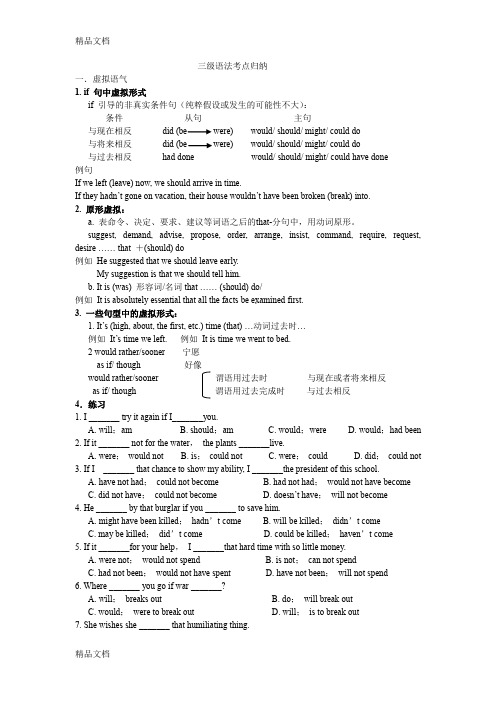
三级语法考点归纳一.虚拟语气1. if 句中虚拟形式if 引导的非真实条件句(纯粹假设或发生的可能性不大):条件从句主句与现在相反did (be were) would/ should/ might/ could do与将来相反did (be were) would/ should/ might/ could do与过去相反had done would/ should/ might/ could have done例句If we left (leave) now, we should arrive in time.If they hadn’t gone on vacation, their house wouldn’t have been broken (break) into.2. 原形虚拟:a. 表命令、决定、要求、建议等词语之后的that-分句中,用动词原形。
suggest, demand, advise, propose, order, arrange, insist, command, require, request, desire …… that +(should) do例如He suggested that we should leave early.My suggestion is that we should tell him.b. It is (was) 形容词/名词that …… (should) do/例如It is absolutely essential that all the facts be examined first.3. 一些句型中的虚拟形式:1. It’s (high, about, the first, etc.) time (that) …动词过去时…例如It’s time we left.例如It is time we went to bed.2 would rather/sooner 宁愿as if/ though 好像would rather/sooner 谓语用过去时与现在或者将来相反as if/ though 谓语用过去完成时与过去相反4.练习1. I _______ try it again if I_______you.A. will;amB. should;amC. would;wereD. would;had been2. If it _______ not for the water,the plants _______live.A. were;would notB. is;could notC. were;couldD. did;could not3. If I _______ that chance to show my ability, I _______the president of this school.A. have not had;could not becomeB. had not had;would not have becomeC. did not have;could not becomeD. doesn’t have;will not become4. He _______ by that burglar if you _______ to save him.A. might have been killed;hadn’t comeB. will be killed;didn’t comeC. may be killed;did’t comeD. could be killed;haven’t come5. If it _______for your help,I _______that hard time with so little money.A. were not;would not spendB. is not;can not spendC. had not been;would not have spentD. have not been;will not spend6. Where _______ you go if war _______?A. will;breaks outB. do;will break outC. would;were to break outD. will;is to break out7. She wishes she _______ that humiliating thing.A. doesn’t doB. didn’t doC. haven’t doneD. hadn’t done8. The chairman suggested that the meeting _______ put off.A. can beB. beC. isD. will be9. It is vital that he _______ immediately.A. should goB. must goC. goesD. went10. It is time we _______do our homework.A. begin toB. can begin toC. began toD. will begin to答案:1.选C。
大学英语三级考试语法总结

different opinions. A. unless B. while C. before D. once 3. I will ask Mr. Smith to ring you up _______ he comes back to the office. A. when B. where C. because D. although
在…之后 一…就…
after as soon as, the moment,
直到 直到…才
the minute, the instant until/till not … until/till
1. The new staff didn’t know how to use the system ______ I explained it to him yesterday.
5. He was attending a meeting, ______ he would have come to your party yesterday.
A. unless B. when C. but D. or 6. She did not go to the party last night, ______ she had to finish her term
考点:
Be-型虚拟语气
2. 在表示命令、决定、建议等词语之后的 that-分句中,分句谓语动词用“should+动词 原形〞或直接用动词原型。
〔1〕用在demand, insist〔坚持〕, order,
大一英语三级知识点

大一英语三级知识点在大一英语三级考试中,有一些重要的知识点需要我们掌握。
下面将会对这些知识点进行详细的介绍和解释。
一、词汇词汇是学习一门语言的基础,大一英语三级考试中也离不开对词汇的考察。
词汇考试主要包括词义辨析、词形变化以及词汇搭配等内容。
我们需要通过大量的阅读和词汇练习来积累和掌握词汇。
二、语法语法是英语学习中非常重要的一个方面,大一英语三级考试中也会涉及到一些基本的语法知识。
例如:时态、语态、主谓一致、从句等。
掌握这些语法知识,能够帮助我们正确理解和使用英语。
三、阅读理解阅读理解是大一英语三级考试中的重点部分。
这部分内容考察我们的阅读能力和理解能力。
在阅读理解中,我们需要快速准确地找到问题的答案,并理解文章的主旨和细节。
四、写作写作是我们学习英语的一个重要方面,也是大一英语三级考试中的一部分。
我们需要掌握一些基本的写作技巧,例如:写作结构、段落组织、句子连接等。
通过不断的练习和积累,我们的写作水平会得到提高。
五、听力大一英语三级考试中还包括听力考试,这对于我们发展听力技能非常重要。
我们需要经常听英语,提高对语音、语调和语速的敏感度,锻炼我们的听力能力。
六、口语口语是我们学习英语的一个重要方面,也是大一英语三级考试中的一部分。
我们需要练习口语表达,提高自己的发音和口语流利度。
七、翻译翻译是大一英语三级考试中的一项任务。
我们需要将中文材料翻译成英文,或将英文材料翻译成中文。
在翻译过程中,我们需要理解原文的含义,并准确地表达出来。
总结通过对大一英语三级的知识点进行了解和总结,我们了解到词汇、语法、阅读理解、写作、听力、口语和翻译是这门考试的重点内容。
只有通过不断的学习和练习,我们才能掌握这些知识点,提高自己的英语水平,顺利通过考试。
希望以上内容对您的学习有所帮助,祝您在大一英语三级考试中取得好成绩!。
大学英语三级语法详解
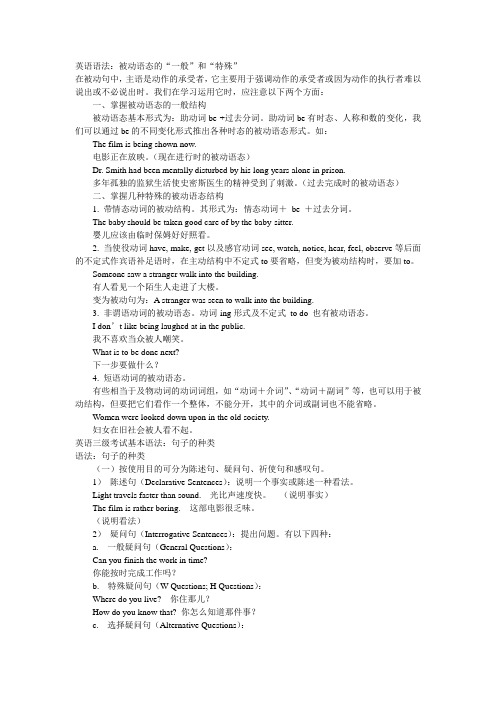
英语语法:被动语态的“一般”和“特殊”在被动句中,主语是动作的承受者,它主要用于强调动作的承受者或因为动作的执行者难以说出或不必说出时。
我们在学习运用它时,应注意以下两个方面:一、掌握被动语态的一般结构被动语态基本形式为:助动词be +过去分词。
助动词be有时态、人称和数的变化,我们可以通过be的不同变化形式推出各种时态的被动语态形式。
如:The film is being shown now.电影正在放映。
(现在进行时的被动语态)Dr. Smith had been mentally disturbed by his long years alone in prison.多年孤独的监狱生活使史密斯医生的精神受到了刺激。
(过去完成时的被动语态)二、掌握几种特殊的被动语态结构1. 带情态动词的被动结构。
其形式为:情态动词+be +过去分词。
The baby should be taken good care of by the baby-sitter.婴儿应该由临时保姆好好照看。
2. 当使役动词have, make, get以及感官动词see, watch, notice, hear, feel, observe等后面的不定式作宾语补足语时,在主动结构中不定式to要省略,但变为被动结构时,要加to。
Someone saw a stranger walk into the building.有人看见一个陌生人走进了大楼。
变为被动句为:A stranger was seen to walk into the building.3. 非谓语动词的被动语态。
动词-ing形式及不定式to do 也有被动语态。
I don’t like being laughed at in the public.我不喜欢当众被人嘲笑。
What is to be done next?下一步要做什么?4. 短语动词的被动语态。
有些相当于及物动词的动词词组,如“动词+介词”、“动词+副词”等,也可以用于被动结构,但要把它们看作一个整体,不能分开,其中的介词或副词也不能省略。
英语三级语法汇总
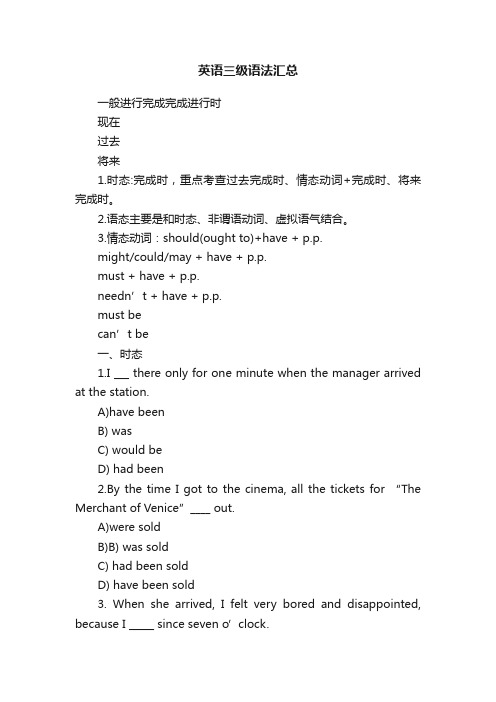
英语三级语法汇总一般进行完成完成进行时现在过去将来1.时态:完成时,重点考查过去完成时、情态动词+完成时、将来完成时。
2.语态主要是和时态、非谓语动词、虚拟语气结合。
3.情态动词:should(ought to)+have + p.p.might/could/may + have + p.p.must + have + p.p.needn’t + have + p.p.must becan’t be一、时态1.I ___ there only for one minute when the manager arrived at the station.A)have beenB) wasC) would beD) had been2.By the time I got to the cinema, all the tickets for “The Merchant of Venice”____ out.A)were soldB)B) was soldC) had been soldD) have been sold3. When she arrived, I felt very bored and disappointed, because I _____ since seven o’clock.B) had been waitingC) were waitingD) have been waited4. My wallet is nowhere to be found. I ___when I was on the bus.A. must have dropped itB. must drop itC. should have dropped itD. have dropped it5. Just as I was leaving the house , it occurred to me that I ____to take my keys . (200406-30)A. should have forgottenB . have forgottenC. had forgottenD. must have forgotten6. They bought their first house last year , previously they _____to get a loan. (200306-21)A. were ableB. weren’t ableC. had been ableD. hadn‘t been able7. By the time we arrive in London, we___in Europe for two weeks. (200406-19)A. shall stayB. have stayedC. will have stayedD. have been staying8. Marie is very wet. She ______ in the river.A. can have fallenC. must have fallenD. needn’t to fall9. With all this work on hand, he ______ to the cinema last night.A. mustn’t goB. wouldn’t goC. ought to goD. shouldn’t have gone10. –Did you blame him for his carelessness?-Yes, but I _______ so.A.‘d rather not doB. shouldn’t doC. ‘d better not have doneD. shouldn’t have done11. “Did Ken take the job in the bookstore?”“No, but I think he ______.”A. will haveB. may haveC. should haveD. must have12. He _______ more than thirty.A. mustn’t beB. shouldn’t beC. won’t beD. can’t be13. You’re right. I _______ of that.A. should thinkB. should have thoughtC. must have thoughtD. needn’t think14. As we can’t get there in time, they ______ about our safety.A. should be worryingB. can be worryingC. must be worryingD. need be worrying15. I have already know about you; you ______ yourself to me.A. shouldn’t have introducedB. needn’t have introducedC. wouldn’t introduceD. mustn’t introduce16. Since my wife isn’t answering her telephone, she ________.A. must have leftB. should have leftC. can have leftD. need have left17. Since the ditch is full of water, it______ hard last night.A. ought to rainB. must have rainedC. might have rainedD. could rain18. Next month they_____ in the United States for thirty years.A. areB. have beenC. will beD. will have been19. It _______ for a week and the street were floodedA. has rainedB. had been rainingC. was rainingD. rained20. He was caught in a traffic jam and by the time he reached the airport his friend’s plane______.A. has already taken offB. had already taken offC. has been taken offD. had been taken off21. They told us that they _______ for more than two hours.A. have waitedB. were waitingC. have been waitingD. had been waiting22. It’s been a long time since I_______. How are you?A. had last seen youB. saw you lastC. have last seen youD. last was seeing you23. You needn’t hurry her. She ______ it by the time you are ready.A. will have been finishingB. will finishC. will have finishedD. will be finishing25. -“I have our tickets.”-“That’s good. I was afraid that you ______ them.”A. had forgottenB. forgotC. have forgottenD. are forgetting26. She said that she ______ soon.A. will go to collegeB. went to collegeC. would go to collegeD. won’t to go to college27. Last night he went to bed early. When we got there, he ______ to bed already.A. wentB. has goneC. had goneD. go二、非谓语动词(动名词、不定时、现在分词、过去分词<只有一种形式>)(doing/ to do/ doing/ done)(一般时、进行时、完成时)(主动、被动)1.英语中有些动词后面只能跟动名词作它的宾语。
英语三级复习整理资料
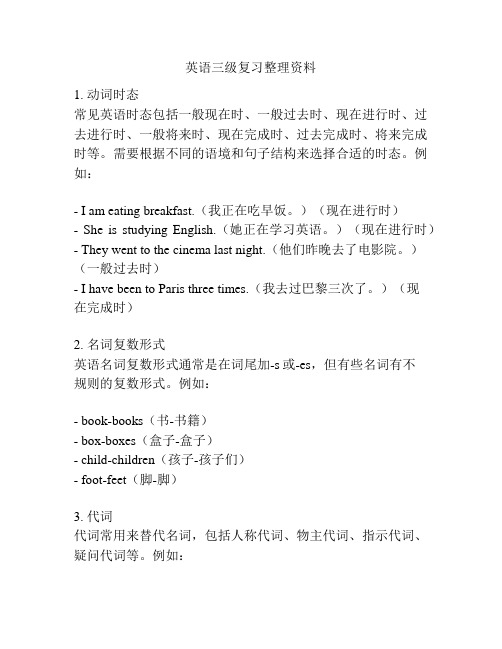
英语三级复习整理资料1. 动词时态常见英语时态包括一般现在时、一般过去时、现在进行时、过去进行时、一般将来时、现在完成时、过去完成时、将来完成时等。
需要根据不同的语境和句子结构来选择合适的时态。
例如:- I am eating breakfast.(我正在吃早饭。
)(现在进行时)- She is studying English.(她正在学习英语。
)(现在进行时)- They went to the cinema last night.(他们昨晚去了电影院。
)(一般过去时)- I have been to Paris three times.(我去过巴黎三次了。
)(现在完成时)2. 名词复数形式英语名词复数形式通常是在词尾加-s或-es,但有些名词有不规则的复数形式。
例如:- book-books(书-书籍)- box-boxes(盒子-盒子)- child-children(孩子-孩子们)- foot-feet(脚-脚)3. 代词代词常用来替代名词,包括人称代词、物主代词、指示代词、疑问代词等。
例如:- He is my friend. I like him.(他是我的朋友。
我喜欢他。
)(人称代词)- This is my book. That is your book.(这是我的书。
那是你的书。
)(指示代词)- Whose bag is this?(这是谁的书包?)(疑问代词)4. 副词副词常用来修饰动词、形容词或其他副词,表示程度、方式、时间等。
常见的副词有常规变化规律的副词和不规则的副词。
例如:- The dog runs quickly.(这只狗跑得很快。
)(常规变化规律的副词)- The boy sings beautifully.(这个男孩唱得很好听。
)(常规变化规律的副词)- He speaks English well.(他英语讲得很好。
)(不规则副词)5. 形容词形容词可以描述名词或代词的特征或性质,一般放在名词前面。
大学英语(3)复习资料整理总结
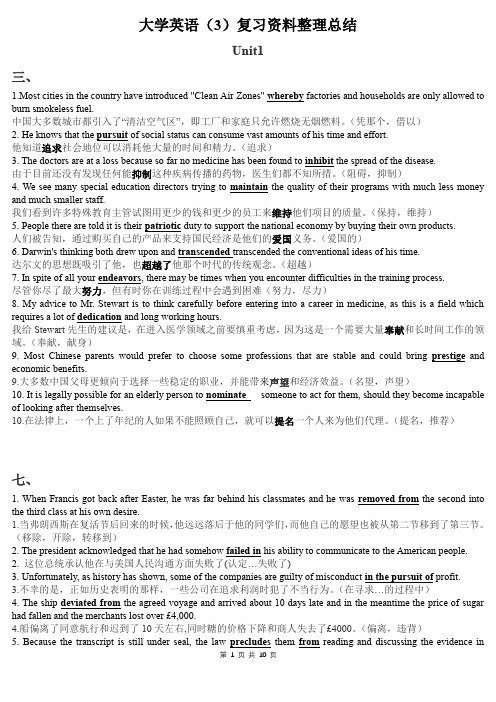
大学英语(3)复习资料整理总结Unit1三、1.Most cities in the country have introduced "Clean Air Zones" whereby factories and households are only allowed to burn smokeless fuel.中国大多数城市都引入了“清洁空气区”,即工厂和家庭只允许燃烧无烟燃料。
(凭那个,借以)2. He knows that the pursuit of social status can consume vast amounts of his time and effort.他知道追求社会地位可以消耗他大量的时间和精力。
(追求)3. The doctors are at a loss because so far no medicine has been found to inhibit the spread of the disease.由于目前还没有发现任何能抑制这种疾病传播的药物,医生们都不知所措。
(阻碍,抑制)4. We see many special education directors trying to maintain the quality of their programs with much less money and much smaller staff.我们看到许多特殊教育主管试图用更少的钱和更少的员工来维持他们项目的质量。
(保持,维持)5. People there are told it is their patriotic duty to support the national economy by buying their own products.人们被告知,通过购买自己的产品来支持国民经济是他们的爱国义务。
(爱国的)6. Darwin's thinking both drew upon and transcended transcended the conventional ideas of his time.达尔文的思想既吸引了他,也超越了他那个时代的传统观念。
英语三级考试复习资料
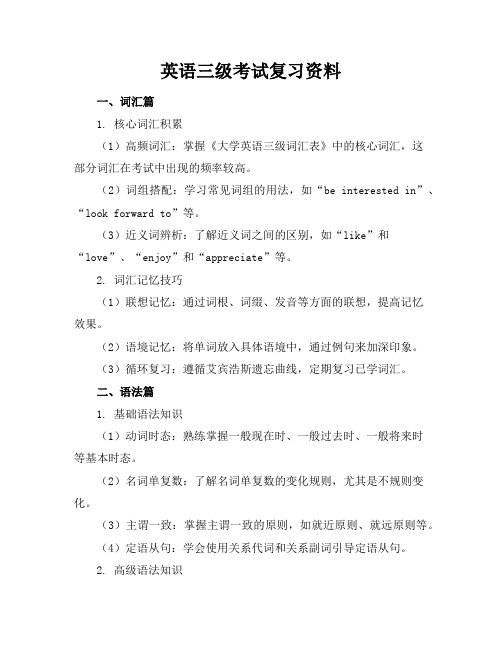
英语三级考试复习资料一、词汇篇1. 核心词汇积累(1)高频词汇:掌握《大学英语三级词汇表》中的核心词汇,这部分词汇在考试中出现的频率较高。
(2)词组搭配:学习常见词组的用法,如“be interested in”、“look forward to”等。
(3)近义词辨析:了解近义词之间的区别,如“like”和“love”、“enjoy”和“appreciate”等。
2. 词汇记忆技巧(1)联想记忆:通过词根、词缀、发音等方面的联想,提高记忆效果。
(2)语境记忆:将单词放入具体语境中,通过例句来加深印象。
(3)循环复习:遵循艾宾浩斯遗忘曲线,定期复习已学词汇。
二、语法篇1. 基础语法知识(1)动词时态:熟练掌握一般现在时、一般过去时、一般将来时等基本时态。
(2)名词单复数:了解名词单复数的变化规则,尤其是不规则变化。
(3)主谓一致:掌握主谓一致的原则,如就近原则、就远原则等。
(4)定语从句:学会使用关系代词和关系副词引导定语从句。
2. 高级语法知识(1)非谓语动词:掌握动名词、分词和不定式作状语、定语等用法。
(2)虚拟语气:了解虚拟语气在条件句、宾语从句等句子中的运用。
(3)倒装句:掌握部分倒装和完全倒装的用法。
三、阅读篇1. 阅读技巧(1)快速浏览:通过、小、首尾段等快速了解文章大意。
(2)精读细节:针对题目,仔细阅读相关段落,找出关键信息。
(3)推断词义:根据上下文,推断生词或短语的意义。
2. 阅读题型攻略(1)事实细节题:关注文章中的具体信息,如时间、地点、人物等。
(2)推理判断题:根据文章内容,进行合理推断。
(3)主旨大意题:把握文章主题,概括文章大意。
四、写作篇1. 写作技巧(1)明确题目要求:认真审题,确保文章内容符合题目要求。
(2)结构清晰:遵循“引言结尾”的结构,使文章条理分明。
(3)丰富表达:运用多样的句式和词汇,提高文章质量。
2. 常见写作题型攻略(1)书信:熟悉书信格式,掌握各类书信的写作要点。
大三英语知识点总结
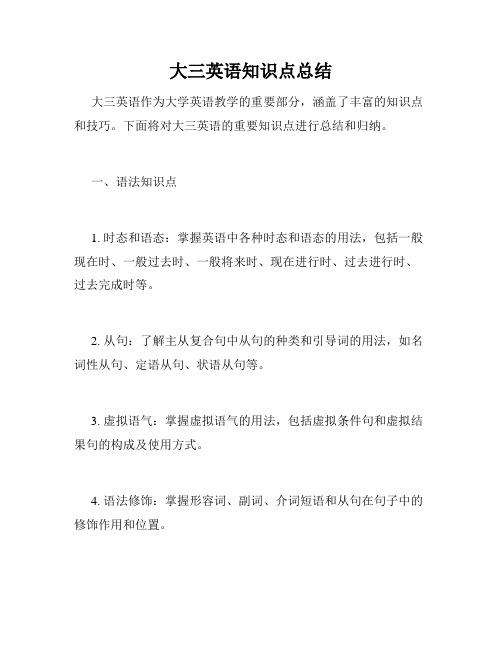
大三英语知识点总结大三英语作为大学英语教学的重要部分,涵盖了丰富的知识点和技巧。
下面将对大三英语的重要知识点进行总结和归纳。
一、语法知识点1. 时态和语态:掌握英语中各种时态和语态的用法,包括一般现在时、一般过去时、一般将来时、现在进行时、过去进行时、过去完成时等。
2. 从句:了解主从复合句中从句的种类和引导词的用法,如名词性从句、定语从句、状语从句等。
3. 虚拟语气:掌握虚拟语气的用法,包括虚拟条件句和虚拟结果句的构成及使用方式。
4. 语法修饰:掌握形容词、副词、介词短语和从句在句子中的修饰作用和位置。
5. 语法结构:了解英语中的常见语法结构,如倒装、强调句等,能够正确运用这些结构提高句子的表达效果。
二、词汇知识点1. 同义词和反义词:扩展词汇量,了解同义词和反义词的用法,并能灵活运用,提高文章的表达能力。
2. 固定搭配和习惯用语:掌握常用的固定搭配和习惯用语,如动词搭配、名词搭配、形容词搭配等,使语言更加地道。
3. 词形转换:了解词汇的词形变化规则,包括名词、动词、形容词和副词的派生和转化,能够准确运用词汇。
4. 词汇辨析:学会辨析难以区分的词汇,如homophones、synonyms和antonyms等,避免在使用中出现错误。
三、阅读理解知识点1. 推理判断:掌握通过推理和推断准确理解文章的能力,包括逻辑推理、因果推理和词义推理等。
2. 主旨大意:能够准确抓住文章的主旨和要点,理解作者的写作意图和观点。
3. 阅读技巧:掌握常见的阅读技巧,如扫读、略读、精读等,提高阅读速度和理解效率。
4. 词汇理解:通过上下文的线索推测词汇的词义,提高词汇的理解和运用能力。
四、写作技巧点1. 句型变化:通过改变句子的结构、时态和语态等,使文章的表达更加准确、丰富和有层次感。
2. 表达方式:掌握不同场合下的表达方式,如感谢信、道歉信、建议信等,使写作更加得体和符合要求。
3. 逻辑关系:合理组织文章的段落和句子,使用适当的连接词和过渡词,使文章的结构和逻辑关系更加清晰。
英语三级知识点范文
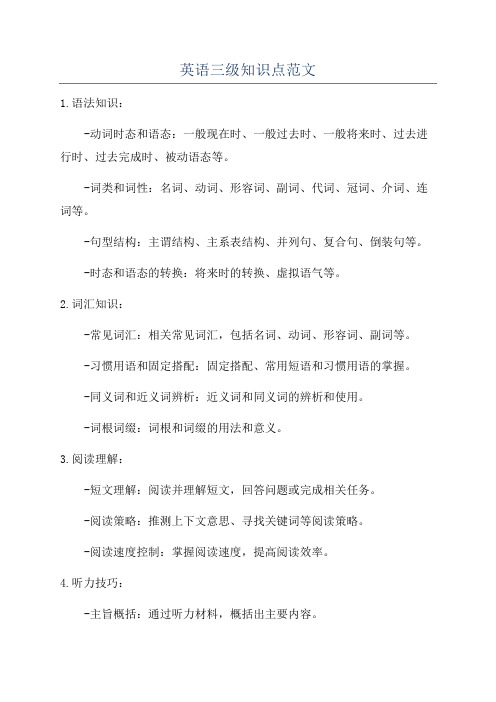
英语三级知识点范文
1.语法知识:
-动词时态和语态:一般现在时、一般过去时、一般将来时、过去进行时、过去完成时、被动语态等。
-词类和词性:名词、动词、形容词、副词、代词、冠词、介词、连词等。
-句型结构:主谓结构、主系表结构、并列句、复合句、倒装句等。
-时态和语态的转换:将来时的转换、虚拟语气等。
2.词汇知识:
-常见词汇:相关常见词汇,包括名词、动词、形容词、副词等。
-习惯用语和固定搭配:固定搭配、常用短语和习惯用语的掌握。
-同义词和近义词辨析:近义词和同义词的辨析和使用。
-词根词缀:词根和词缀的用法和意义。
3.阅读理解:
-短文理解:阅读并理解短文,回答问题或完成相关任务。
-阅读策略:推测上下文意思、寻找关键词等阅读策略。
-阅读速度控制:掌握阅读速度,提高阅读效率。
4.听力技巧:
-主旨概括:通过听力材料,概括出主要内容。
-细节理解:听取细节信息,回答相关问题。
-对话场景判断:根据对话内容,判断场景和人物关系。
-短文完形填空:根据短文内容,选择正确的选项。
5.口语表达:
-日常交际用语:问候、介绍自己、提出请求、道歉、感谢、邀请等常见交际用语。
-自我介绍:掌握简单自我介绍的表达方式。
-问答对话:回答与问题相匹配的内容,进行对话交流。
-完成任务:按要求进行任务表达,如描述图片、演讲等。
6.写作技巧:
-信件写作:写推荐信、道歉信、感谢信、邀请信等。
-短文写作:写文章、记叙文、说明文等。
-日记写作:根据给定的时间和话题,进行日记写作。
公共英语三级语法大总结
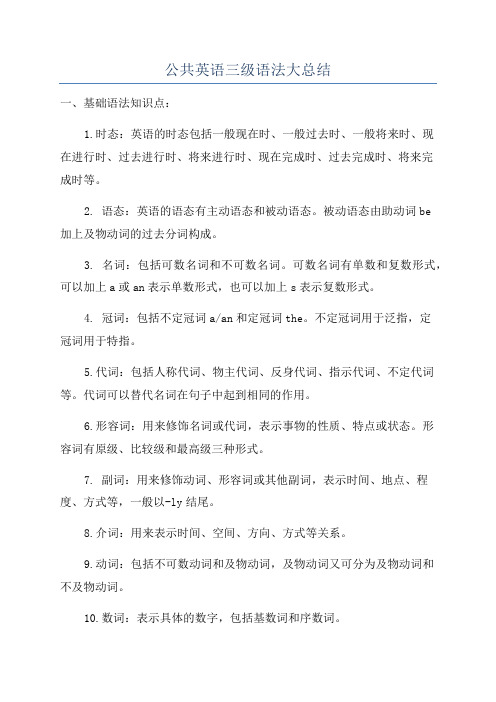
公共英语三级语法大总结一、基础语法知识点:1.时态:英语的时态包括一般现在时、一般过去时、一般将来时、现在进行时、过去进行时、将来进行时、现在完成时、过去完成时、将来完成时等。
2. 语态:英语的语态有主动语态和被动语态。
被动语态由助动词be加上及物动词的过去分词构成。
3. 名词:包括可数名词和不可数名词。
可数名词有单数和复数形式,可以加上a或an表示单数形式,也可以加上s表示复数形式。
4. 冠词:包括不定冠词a/an和定冠词the。
不定冠词用于泛指,定冠词用于特指。
5.代词:包括人称代词、物主代词、反身代词、指示代词、不定代词等。
代词可以替代名词在句子中起到相同的作用。
6.形容词:用来修饰名词或代词,表示事物的性质、特点或状态。
形容词有原级、比较级和最高级三种形式。
7. 副词:用来修饰动词、形容词或其他副词,表示时间、地点、程度、方式等,一般以-ly结尾。
8.介词:用来表示时间、空间、方向、方式等关系。
9.动词:包括不可数动词和及物动词,及物动词又可分为及物动词和不及物动词。
10.数词:表示具体的数字,包括基数词和序数词。
11.简单句:由主语和谓语构成,可以包含宾语、表语、宾语补足语等。
12.并列句:由两个或多个简单句用并列连词连接而成,表示并列关系。
13.复合句:包括主从复合句和连接复合句。
主从复合句由一个主句和一个或多个从句构成,连接复合句由两个或多个从句构成。
14.修饰语从句:修饰一个名词或代词的从句,通常由关系代词或关系副词引导。
15.定语从句:修饰一个名词或代词的从句,通常由关系代词或关系副词引导。
16.状语从句:修饰动词、形容词或副词的从句,通常由连词或连词短语引导。
17.祈使句:表示请求、命令、建议等,一般不指明主语,用动词原形开头。
18.感叹句:表示惊讶、高兴、忧虑等感叹的句子。
19.反意疑问句:用来表示征求对方的同意或确认,一般由一个陈述句和相应的疑问句组成。
二、高级语法结构:1.过去完成时:表示在过去一些时间点之前已经完成的动作或事件。
大学英语三级考试语法复习要点总结
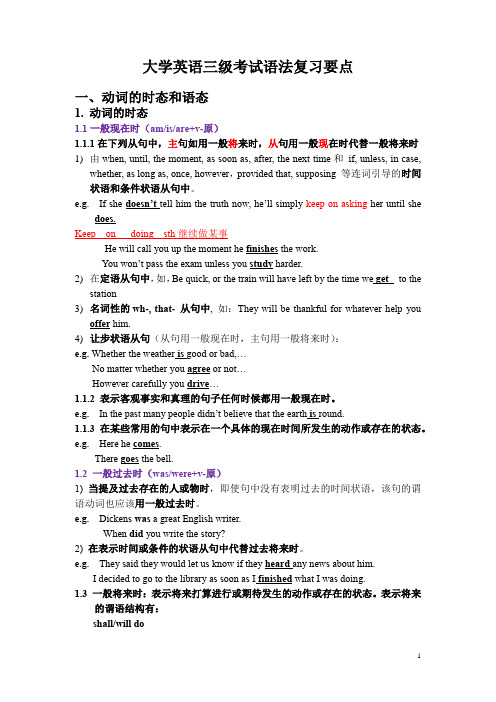
大学英语三级考试语法复习要点一、动词的时态和语态1. 动词的时态1.1一般现在时(am/is/are+v-原)1.1.1在下列从句中,主句如用一般将来时,从句用一般现在时代替一般将来时1)由when, until, the moment, as soon as, after, the next time和if, unless, in case,whether, as long as, once, however,provided that, supposing 等连词引导的时间状语和条件状语从句中。
e.g. If she doesn’t tell him the truth now, he’ll simply keep on asking her until shedoes.Keep on doing sth继续做某事He will call you up the moment he finishes the work.You won’t pass the exam unless you study harder.2)在定语从句中,如,Be quick, or the train will have left by the time we get to thestation3)名词性的wh-, that-从句中, 如:They will be thankful for whatever help youoffer him.4)让步状语从句(从句用一般现在时,主句用一般将来时):e.g. Whether the weather is good or bad,…No matter whether you agree or not…However carefully you drive…1.1.2 表示客观事实和真理的句子任何时候都用一般现在时。
e.g.In the past many people didn’t believe that the earth is round.1.1.3 在某些常用的句中表示在一个具体的现在时间所发生的动作或存在的状态。
大学英语三级考试语法总结
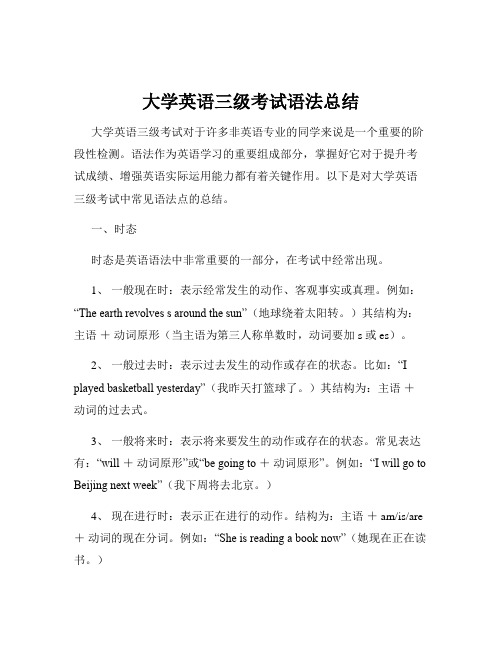
大学英语三级考试语法总结大学英语三级考试对于许多非英语专业的同学来说是一个重要的阶段性检测。
语法作为英语学习的重要组成部分,掌握好它对于提升考试成绩、增强英语实际运用能力都有着关键作用。
以下是对大学英语三级考试中常见语法点的总结。
一、时态时态是英语语法中非常重要的一部分,在考试中经常出现。
1、一般现在时:表示经常发生的动作、客观事实或真理。
例如:“The earth revolves s around the sun”(地球绕着太阳转。
)其结构为:主语+动词原形(当主语为第三人称单数时,动词要加 s 或 es)。
2、一般过去时:表示过去发生的动作或存在的状态。
比如:“I played basketball yesterday”(我昨天打篮球了。
)其结构为:主语+动词的过去式。
3、一般将来时:表示将来要发生的动作或存在的状态。
常见表达有:“will +动词原形”或“be going to +动词原形”。
例如:“I will go to Beijing next week”(我下周将去北京。
)4、现在进行时:表示正在进行的动作。
结构为:主语+ am/is/are +动词的现在分词。
例如:“She is reading a book now”(她现在正在读书。
)5、过去进行时:表示过去某个时刻正在进行的动作。
其结构为:主语+ was/were +动词的现在分词。
如:“I was watching TV at eighto'clock last night”(昨晚八点我正在看电视。
)6、现在完成时:表示过去发生的动作对现在造成的影响或结果,或者过去开始一直持续到现在的动作。
结构为:主语+ have/has +过去分词。
比如:“I have finished my homework”(我已经完成了作业。
)7、过去完成时:表示过去某个时间之前已经完成的动作。
结构为:主语+ had +过去分词。
例如:“By the end of last year, we had learned 2000 words”(到去年年底,我们已经学了 2000 个单词。
英语三级必考语法1

●●我不记得向你借过钱。
●Remember我忘了我见过他。
●Don’t forget●我后悔没有努力学英语.(regret—懊悔,studying表示发生在谓语动作之前.)●I regret我很抱歉不能和你一起去看电影。
(regret—抱歉,to say是指现在。
)1.You were brave enough to raise objections at the meeting。
--Well,now I regret _______ that。
A. to do B。
to be doing C. to have done D. having done1.D regret doing sth (或having done sth)=后悔做……。
Regret to do sth=抱歉或者遗憾做……。
我打算坐飞机去.(propose—打算,go there指自己去。
)●He proposes他建议坐飞机去.(propose—建议;going there是泛指;不见得是他本人.)在need,want,clean,require,to be worth等词后面跟动名词时,一般不用被动,用不定式需用被动。
as-—尽管as引导让步状语从句时,句子通常倒装。
可与though互换as——因为,通常放在句首。
情态动词一、“must do (be)” must be doing"表示对现在情况的推测“must have done (been)"表示对过去情况的推测.二、should/ought to “should/ought to have done (been)。
"表示过去应该做而没有做三、could “could have done(been)"表示过去时间里某个动作或某种情况本来能发生,但事实上并未发生。
四、had better和would rather,would sooner.。
大学英语三级语法详解
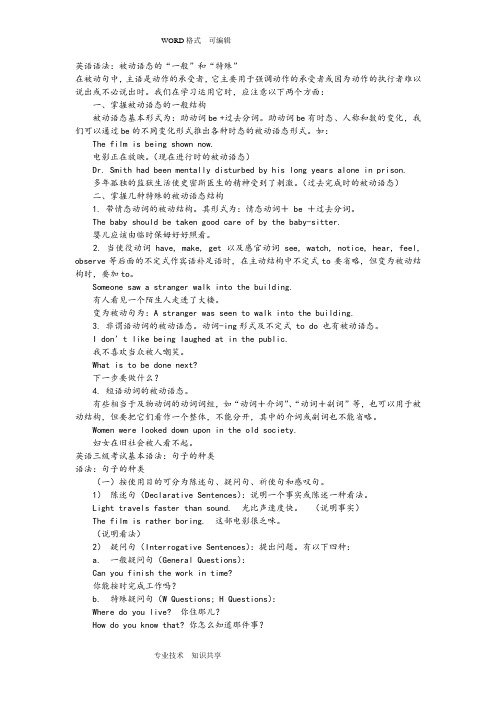
英语语法:被动语态的“一般”和“特殊”在被动句中,主语是动作的承受者,它主要用于强调动作的承受者或因为动作的执行者难以说出或不必说出时。
我们在学习运用它时,应注意以下两个方面:一、掌握被动语态的一般结构被动语态基本形式为:助动词be +过去分词。
助动词be有时态、人称和数的变化,我们可以通过be的不同变化形式推出各种时态的被动语态形式。
如:The film is being shown now.电影正在放映。
(现在进行时的被动语态)Dr. Smith had been mentally disturbed by his long years alone in prison.多年孤独的监狱生活使史密斯医生的精神受到了刺激。
(过去完成时的被动语态)二、掌握几种特殊的被动语态结构1. 带情态动词的被动结构。
其形式为:情态动词+ be +过去分词。
The baby should be taken good care of by the baby-sitter.婴儿应该由临时保姆好好照看。
2. 当使役动词have, make, get以及感官动词see, watch, notice, hear, feel, observe等后面的不定式作宾语补足语时,在主动结构中不定式to要省略,但变为被动结构时,要加to。
Someone saw a stranger walk into the building.有人看见一个陌生人走进了大楼。
变为被动句为:A stranger was seen to walk into the building.3. 非谓语动词的被动语态。
动词-ing形式及不定式 to do 也有被动语态。
I don’t like being laughed at in the public.我不喜欢当众被人嘲笑。
What is to be done next?下一步要做什么?4. 短语动词的被动语态。
新英语三级考试常考知识点

新英语三级考试常考知识点1. Grammar: Present simple and continuous tenses, past simple and continuous tenses, future forms (will, going to, present continuous), present perfect and past perfect tenses, modal verbs, passive voice, conditionals (zero, first, second, third), reported speech, comparative and superlative forms, adverbs and adjectives, articles, pronouns, prepositions.2. Vocabulary: Synonyms, antonyms, homonyms, idioms, collocations, word formation (prefixes, suffixes), phrasal verbs, expressions with prepositions, compound words.3. Reading: Reading comprehension, understanding main ideas, understanding details, understanding inferred meaning, understanding factual information, understanding opinions and attitudes, understanding text organization (paragraphs, headings), understanding writer's purpose.4. Writing: Writing an essay, writing a letter, writing a report, writing a short story, writing a summary, writing a description, writing an argument, writing a review.5. Listening: Listening for general understanding, listening for specific information, listening for inferred meaning, listening for opinions and attitudes, listening for factual information, listening for the main idea, listening for details.6. Speaking: Answering questions, giving opinions, expressing agreement and disagreement, making suggestions, asking for clarification, describing people and places, talking about pastexperiences, talking about future plans, giving reasons and examples, comparing and contrasting.。
- 1、下载文档前请自行甄别文档内容的完整性,平台不提供额外的编辑、内容补充、找答案等附加服务。
- 2、"仅部分预览"的文档,不可在线预览部分如存在完整性等问题,可反馈申请退款(可完整预览的文档不适用该条件!)。
- 3、如文档侵犯您的权益,请联系客服反馈,我们会尽快为您处理(人工客服工作时间:9:00-18:30)。
大学英语三级考试语法复习要点一、动词的时态和语态1. 动词的时态1.1一般现在时(am/is/are+v-原)1.1.1在下列从句中,主句如用一般将来时,从句用一般现在时代替一般将来时1)由when, until, the moment, as soon as, after, the next time和if, unless, in case,whether, as long as, once, however,provided that, supposing 等连词引导的时间状语和条件状语从句中。
e.g. If she doesn’t tell him the truth now, he’ll simply keep on asking her until shedoes.Keep on doing sth继续做某事He will call you up the moment he finishes the work.You won’t pass the exam unless you study harder.2)在定语从句中,如,Be quick, or the train will have left by the time we get to thestation3)名词性的wh-, that-从句中, 如:They will be thankful for whatever help youoffer him.4)让步状语从句(从句用一般现在时,主句用一般将来时):e.g. Whether the weather is good or bad,…No matter whether you agree or not…However carefully you drive…1.1.2 表示客观事实和真理的句子任何时候都用一般现在时。
e.g.In the past many people didn’t believe that the earth is round.1.1.3 在某些常用的句中表示在一个具体的现在时间所发生的动作或存在的状态。
e.g.Here he comes.There goes the bell.1.2 一般过去时(was/were+v-原)1) 当提及过去存在的人或物时,即使句中没有表明过去的时间状语,该句的谓语动词也应该用一般过去时。
e.g.Dickens was a great English writer.When did you write the story?2) 在表示时间或条件的状语从句中代替过去将来时。
e.g.They said they would let us know if they heard any news about him.I decided to go to the library as soon as I finished what I was doing.1.3 一般将来时:表示将来打算进行或期待发生的动作或存在的状态。
表示将来的谓语结构有:shall/will dobe going to dobe about to do : 表示动作“正要”,“刚要”发生,不与表示将来的时间状语连用。
be to do :表示按“日程”将要发生的动作,或用来征询意见。
be doing (come, go, arrive, drive, fly, leave, start, plan )will be doing: 常表示预计即将发生或势必发生的动作,它含有已经安排好的意思。
e.g. We must hurry. The film is about to start.George is arriving on the four o’clock train this afternoon.There is to be a test at the end of this term.Are we to go now?Don’t worry. I expect I’ll be seeing him tomorrow. Then I can tell him about it.试比较:I will be seeing him about it tomorrow.I’ll see him about it tomorrow. (末事先安排好)1.4 现在进行时(be doing)该时态可以同频度副词,如:always, forever, constantly连用,带有情感色彩,如赞扬或厌烦等。
e.g. He is always asking the same question.试比较:He is always coming late.He always comes late.1.5 现在完成时(have /has+done)1) 在含有the first/ second time/superlative degree +n 句型中,通常用现在完成时e.g. This is the first time they have traveled by air.This is the most interesting novel I have ever read.2) 由连词since 引出状语从句时,主句一般都用现在完成时,有时用现在完成进行时,从句用一般过去时。
句型:S+have/has V-ed2/been V-ing since s + V-ed1e.g. I have not heard from her since we graduated from university.He has been working in this school since he came here.3) 用于时间状语从句或条件状语从句表示将来完成的动作。
e.g. I will return your book on Monday if I have read it.. 具体的某一天用onI will let you know after I have talked with him.The students will go home as soon as they have finished the exams.Check it out when you have finished it.4) 现在完成时经常与不确定的过去时间状语连用,如:already, just, yet, before, recently, lately等;也可同表示频度的时间状语连用,如:often, ever, never, twice, 等;还可同表示一段时间的状语连用,如:for, since, in(for) the last/past ten years,these ten days, up to now, so far等。
5) go, come, return, buy, become, join, borrow等瞬间动词不能和表示延续的时间状语连用。
要表示有关的意思时应该用have 的完成时或be 的完成时。
e.g. They have been back for more than a month.不能说:They have come back for more than a month.He has had the bike for two years.不能说:He has bought the bike for two years.1.6 现在完成进行时(have been doing)强调一个动作从过去开始一直持续到现在,没有中断过,并将继续下去。
e.g. He has been doing his homework all the morning but hasn’t finished it yet.1.7 过去完成时这是一个相对的时态,只有与过去时或过去某个动作相比较时才能用。
1) 在含有when, before, after, until, as soon as 等引起的时间状语的主从句中,若主从句谓语均表过去的动作,则动作在先的用过去完成时。
e.g. When I had finished my homework, I went out for a walk.They had left before I returned.2) 在含有hardly, scarcely, barely, no sooner 等词的主从复合句中,从句谓语一般用过去完成时,主句用一般过去时。
e.g. No sooner had I arrived at the school than the bell rang.Hardly had he finished his speech when the audience started cheering.3) 含有by the end of + 过去时间的介词短语的句子中,谓语动词应用过去完成时。
e.g. She had finished her design by the end of last month.4) 有些动词,如intend, hope, plan, mean, think等的过去完成时表示过去未曾实现的希望、打算或意图。
e.g. I had hoped that she would answer my letter.She had intended to go to the cinema last night, but she was busy then.1.8 过去完成进行时表示过去某时或某动作之前的动作或状态一直持续到过去某个时候,没有中断过。
e.g. He had been working in the office for two years before she got a raise.1.9 将来完成时:表示将来某时之前已完成的动作。
e.g. By the end of this month, we surely will have found a satisfactory solution tothe problem.The conference will have lasted a full week by the time it ends.2. 被动语态在不知道或没有必要说明动作的执行者是谁时,或者为了突出或强调动作承受者时,就用被动语态。
e.g. My bike was stolen last night.The plan has been made.结构:be+V-ed22.2 含有情态动词的被动语态结构:情态动词+be+V-ed2e.g. All that can be done has been done.The work must be done at once.3.时态的呼应在主从复合句中,主要是在宾语从句中,时态常受主句谓语动词时态的影响,从句的时态要做一些必要的调整,这种现象叫时态的呼应。
